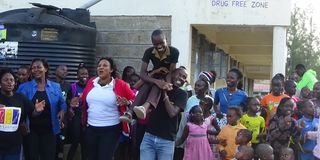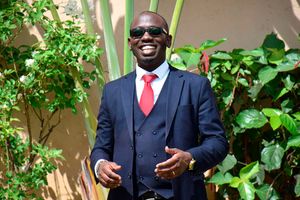Why good KCPE results don't excite Ngwata Primary School candidates

Teachers and pupils at Ngwata Primary School, led by their headteacher Faith Mwende Maeke (middle in red top) celebrate after the 2021 KCPE exam results were released on Monday. Deogratia Ndanu Mutua one of their top performers, scored 373 marks.
Across the country, most primary schools welcomed the 2021 Kenya Certificate of Primary Education (KCPE) exam results, which were released on Monday, with song and dance.
Anxious parents and their children trooped into schools to know the results. But at Ngwata Primary School in Mlolongo, Machakos County, the situation was different.
Most of the parents were away looking for menial jobs because they are casual labourers.
A small crowd comprising learners and teachers stood outside the classrooms. Some of the learners, among the 394 candidates who sat the KCPE exam at the institution, came to get their results.
As they spoke in low hushed tones, the pupils' faces told of the uncertainty about what the future holds for them. Most of the pupils are unable to join the secondary schools where they have been admitted because their parents cannot afford to pay for their secondary education.
"Most of our learners come from dysfunctional and disadvantaged backgrounds, even getting a meal at home is a challenge," said the institution’s headteacher Faith Mwende Maeke.
Even with the impressive results, there was a lot of calmness around the school. Top candidates, Jeremy Musila and Simon Charo posted 385 marks while the top girl, Mercy Mueni, scored 377 marks.
Scored over 320 marks
“From the few learners whose results I have been able to check, I am certain that over half of the class has scored over 320 marks,” Ms Maeke said.

Teachers and pupils at Ngwata Primary School in Mlolongo, led by the headteacher Faith Mwende Maeke (in the middle with a white top and red sweater) celebrate Jeremy Musila, one of their top performers who scored 385 marks in the 2021 KCPE exam.
However, her joy fades when the usual reality replays in her mind. Most of her pupils are unable to transit to secondary school because their parents cannot afford to pay for their secondary education.
Despite the 100 percent transition recorded by the school last year, only 35 learners of the 324 candidates who sat the 2020 KCPE joined secondary schools that they had been called to. The rest joined nearby day schools and vocational training centers besides being called to national and county high schools
Of the 35, 10 were sponsored by Amara Charitable Trust, NGCDF sponsored 6, Patrick Makau Foundation sponsored 16 and Equity Bank's Wings to Fly sponsored three.
“Together with my teachers, we sponsored three at Mlolongo Secondary School where the school fees is affordable since it is a day school,” said the headteacher.
With a population of 3,021, Ngwata Primary School, located at the heart of Mlolongo Phase Three, is one of the most populated public primary schools in lower Eastern. It also ranks among the top 50 highly populated primary schools in Kenya.
Most of the pupils come from the densely populated Mlolongo neighbourhood and its informal settlements such as Kasina, Kathangaita, and Kicheko slums, which borders Syokimau.
Amara Trust
"The learning here is free, as most of my parents are casual labourers, " says Ms Maeke.
With the average family in Mlolongo struggling to put food on the table, the learners cannot afford lunch. However, a charitable organisation, the Amara Trust has been providing lunch for the learners since the school began in 2014. The organisation provides githeri (boiled maize and beans), three days a week.
"However, I ration the food to ensure it lasts five days in a week. I want to keep them in class," Ms Maeke told Nation.Africa.
She added: “This is the only meal that they have in a day, and it is what keeps them in school.”
"They (pupils) even carry any left-over githeri in their containers since they come from very needy families," she said.
High population
Besides its high population of 3,021 the school has only 37 teachers.
“The teacher-pupil ratio here is unimaginable, our teachers have to work extra hard,” she says.
Most of the classes have over 250 learners. The average class size has 137 pupils.
Ms Maeke does not have a physical office. Together with the rest of the teachers, she operates from one of the classrooms.
The number of KCPE exam candidates in the institution has increased sharply since 2018. In 2018, only 99 learners sat the national examinations, but in 2019, 2020 and 2021, this number rose to 224, 324 and 394 respectively.
Most of the pupils are vulnerable children, something that has seen Ms Maeke assume the roles of a mother.
“When children get caught up in family disputes, I have to step in,” she said.
For instance, this year, she had to accommodate one of the KCPE exam candidates in her house.
“I had to house her (candidate) after she had a disagreement with her mother. The mother left and the pupil could not live alone in the slum,” she said.
Teachers at the school do a lot of mentorship and counselling to keep the learners focused on their academic goals.
There is a lot of negative influence from the slums.
“Once I admit a pupil, I teachers ensure that the learner keeps off bad social habits such as substance and drug abuse and early sex,” says Ms Maeke.
"I am happy with what the government is doing through the Ministry of Education to ensure our learners fully transit to secondary school. I call on organisations to consider our learners for scholarships so that more can join the school's that they have been called to," she concluded.




